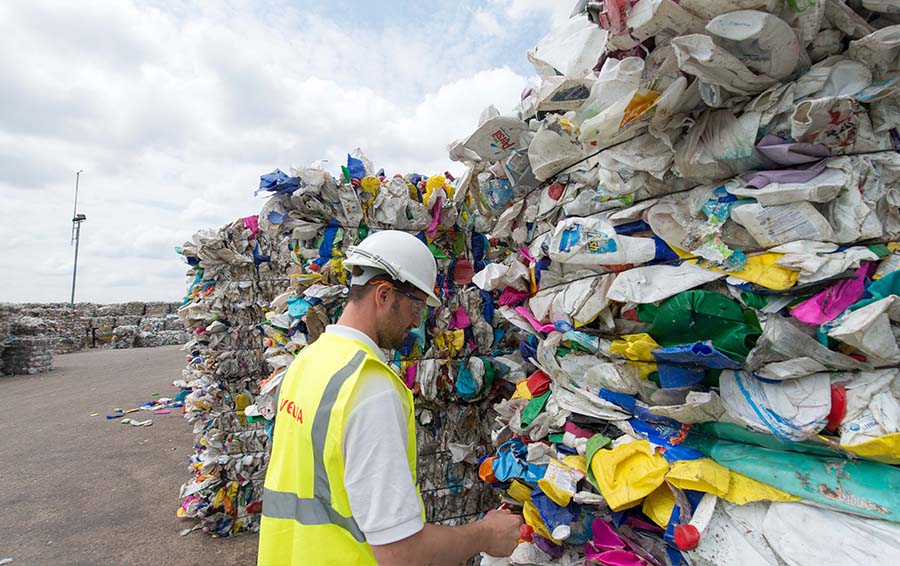Projects to reduce landfill and incineration of waste plastics and schemes to recycle waste into new, sustainable plastics have received a funding boost today.
UK Research and Innovation (UKRI) is investing £20m in four cutting edge recycling plants. These plants will increase the available recycling capacity in the UK and expand the range of plastics being recycled, as opposed to being sent to landfill or incineration, or exported overseas for disposal.
The £20m investment from the Industrial Strategy Challenge Fund, along with over £65m of industry investment, represents the largest investment the UK has made in plastic packaging recycling technologies.
The technologies include a hydrothermal liquefaction process to convert waste plastic into chemicals and oils for use in the manufacture of new plastic, a thermal cracking procedure to transform end-of-life plastics into hydrocarbon oil that can be used in plastic production, and a depolymerising facility that extracts colour from waste allowing easier reuse.
The projects are:
– Veolia in collaboration with Unilever, Charpak Ltd and HSSMI will develop the UK’s first dual PET bottle and tray recycling facility (supported by a digital twin created by HSSMI), capable of recycling 100% of clear rigid PET in a closed-loop system. Unilever will investigate the non-food contact recycled PET produced from this facility in its home and personal care range, so avoiding the use of food contact grade material in these non-food products. Charpak Ltd will use the flakes produced in its trays, making tray to tray recycling a reality. This will create a new, complementary non-food closed loop for recycled PET and widen availability of the material for use in bottles and trays. Through the development and use of the digital twin, HSSMI will pioneer a virtual engineering approach in the waste industry, which will help optimise the facility and identify potential commercial challenges. If initial trials are successful, the proposed facility would process 35,000tpa of mixed PET packaging waste at an existing Veolia site.
– ReNew ELP proposes to set up a plant centred on a Catalytic Hydrothermal Reactor (Cat-HTR™) at Wilton, Teesside. Once up and running, the plant would convert 20,000 tonnes per annum (tpa) (increasing to 80,000tpa on site completion) of end of life plastic into chemicals and oils for use in the production of new virgin grade plastics including naphtha, waxes, and a bitumen-like residue suitable for use in road construction.
– Recycling Technologies has been awarded funding for a chemical recycling plant that uses thermal cracking to recycle a wide range of plastic waste that cannot be recycled by conventional methods. The plant is designed to process 7,000tpa of hard-to-recycle mixed plastic waste, producing 5,200tpa of a hydrocarbon oil which can replace crude oil in plastics production – allowing plastic to be recycled an unlimited number of times. It will be based in Perth, Scotland. With partners, Neste Corporation and Unilever, this project combines the expertise of these three global leaders in their respective business areas to develop chemical recycling and make hard-to-recycle plastic packaging, such as films, sachets and pouches, recyclable.
– Poseidon Plastics aims to commercialise its novel enhanced recycling technology through the construction of a 15,000 tonne per annum PET recycling facility. Partnering with waste collection and mechanical recycling experts Biffa and PET resin producers Alpek Polyester UK and DuPont Teijin Films UK, this project aims to demonstrate how post-consumer and post-industrial packaging, film and other hard-to-recycle PET wastes can be chemically recycled back into new consumer end-use goods. Through collaboration with the Green Chemistry Centre of Excellence at the University of York and polyester fibre users O’Neills Irish International Sports Company and GRN Sportswear (trading as Presca Sportswear), the consortium further aims to demonstrate and optimise a closed-loop, circular economy for all polyester materials.
Environment Minister Rebecca Pow said:
“The Government is committed to both clamping down on the unacceptable plastic waste that harms our environment and ensuring more materials can be reused instead of being thrown away.
“By investing in these truly ground-breaking technologies we will help to drive these efforts even further, and I look forward to seeing them develop and deliver real results.”
The four projects won their funding by submitting applications outlining prototypes for innovative new recycling technology as part of a UKRI competition launched in December 2019. The grants will now help them turn theory into practice, bringing the plants online and scaling up their operations.
The funding forms part of UKRI’s Smart Sustainable Plastic Packaging (SSPP) challenge, which aims to increase the amount of recyclable plastic packaging and improve UK productivity in plastics, leading to a reduction in plastic waste entering the environment.
Paul Davidson, challenge director of the SSPP challenge, said:
“To help protect the planet from waste pollution it is critical that plastics are more readily recycled and sustainable. The plastic packaging industry is changing, to become more responsive to our environmentally conscious concerns.
“The work of our four demonstrator winners will go a long way to reinstate plastic as a sustainable packaging choice. In particular, our winners demonstrated they have a lifecycle approach to plastics packaging, thinking through the use of a material from its raw state, through to its transport, its use by consumers and its disposal.
“This funding is just the start and we are planning further competitions in the near future.”
Further details: ReNew ELP and Poseidon Plastics projects are located at the Wilton International site at Teesside, in close proximity to other plastic packaging and recycling infrastructure. These projects have the potential to create around 200 jobs in the Teesside area, a significant boost to the economy in the North of England. Recycling Technologies will create a number of job opportunities in Scotland.
Registration is now open for the Future Plastic Packaging Solutions competition briefing event on 3rd November, hosted by KTN and UKCPN. Competition opens end of October. Further SSPP compeititons will be opening in 2021.






